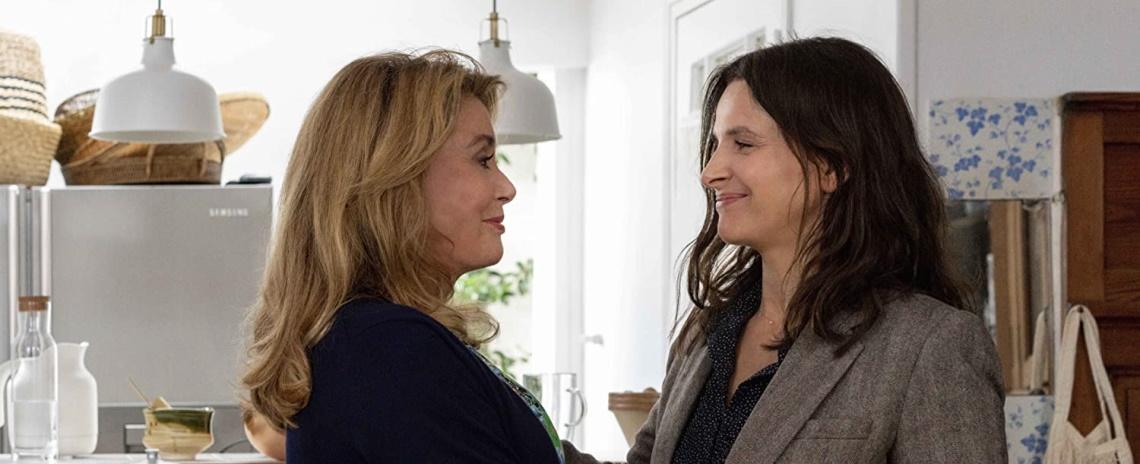Great acting is not make-believe. As a matter of fact, truly great acting — which requires the performer to channel their pains and joys into a role — is more real than life itself. It’s the difference between a truthful performance and a cheap imitation. All this according to legendary French actress Fabienne Dangeville (Catherine Deneuve), who has included many of these grandiose notes on the craft in her upcoming memoir. Deneuve, the star of Kore-eda Hirokazu’s The Truth — the filmmaker’s first feature set outside of Japan — inhabits a fictionalized version of herself in Fabienne. Instead of landing leading roles like Deneuve, Fabienne is now the kind of actress who takes second billing to the latest rising star. It’s a demotion she’s less than pleased about, but one she needs to endure if she wishes to remain relevant in an art that feels less and less artful to her with each passing day.
To celebrate the release of her mother’s memoir, Fabienne’s French-born screenwriter daughter, Lumir (Juliette Binoche), visits from New York with her actor husband, Hank (Ethan Hawke), and daughter (Clémentine Grenier). It’s a reunion that’s guaranteed to be uncomfortable because of two separate elephants in the room. The first is Fabienne’s past habit of putting her career over family during Lumir’s upbringing, often leaving her daughter in the hands of relatives. The second is the glaring absence of Sarah Mondavan, a fellow actress and family friend who had a seemingly profound influence on the Dangeville women’s lives before her untimely passing decades earlier. As to be expected, Lumir and Fabienne start bickering almost immediately. Lumir, just now getting her hands on a copy of the new book, is beyond frustrated with the inconsistencies and flat-out lies that litter the pages of text. To Fabienne, the stories are like playing a role. To everyone else, they’re the exact kind of cheap imitations that Fabienne claims to rail against.
Where does the truth lie for a creative with fleeting memories of their past? In the faulty recollections they mine for material, or in the performance that plays out on screen as they dwell on those past experiences? These are the questions that Kore-eda Hirokazu asks repeatedly throughout The Truth, as the line between truth and artifice grows increasingly blurrier on the set of Fabienne’s latest film. That feature, Memories of My Mother is a hokey sci-fi epic about a mother with a terminal diagnosis who leaves her husband and daughter behind on Earth so she can inexplicably prolong her life in space. The protagonist returns once every few decades to find her loved ones becoming progressively detached from her. Despite the obvious similarities between the story and her real life, Marienne actually plays the daughter at age 73, while up-and-comer Manon Lenoir (Manon Clavel) — whom everyone keeps comparing to the late Sarah at the height of her glory — plays the ageless matriarch. It’s Fabienne’s assignment to the film-within-a-film daughter role — which pointedly mirrors Lumir’s upbringing — that finally allows her to see the world through her daughter’s experiences.
The tension on set and at home brings out the very worst in Fabienne and Lumir, making for a pair of fine performances from Deneuve and Binoche. The two are legends of French filmmaking for a reason, and Kore-eda doesn’t let an ounce of their respective talents go to waste. (Hawke, on the other hand, is all but squandered as the American dad relegated to the side of the frame for the duration of the runtime, head swiveling back-and-forth as his wife and mother-in-law bicker in a language in which he’s only rudimentarily able to communicate.) The bond between Deneuve and Binoche’s characters is believable, even when Kore-eda’s material — which is rife with softball critiques of streaming television, blockbuster filmmaking, and the forced retirement of a whole slew of aging actresses — occasionally meanders through well-trodden territory.
Kore-eda’s question remains: What part does real life — the truth — play in an actor’s performance? When a character is crying on screen, are the actor’s tears originating from their immersion in the character or from some personal experience? When the scene calls for a character to fight with another, is that anger and frustration coming from their dedication to the part or from their own experiences in a personal dispute? Ultimately, Kore-eda’s answer — if there even is one — isn’t as clear as his central inquiry. The film would rather ask rhetoricals, taking an interrogative tone over a didactic one at nearly every opportunity. It’s more of a survey than a thesis: The film does the questioning, but it leaves the answer space blank.
The Truth feels strongest when it’s exploring the family dynamic rather than the state of cinema. Themes of collective memories, the weathered bond between kin, and meaningful ruminations on the real role of a lifetime — being there for your loved ones — are as bountiful as the copies of Fabienne’s memoir that clutter the film’s scenes. This all seems on par with Kore-eda’s filmography so far, with many of his most well-received films focusing on exactly this: Shoplifters (2018), Still Walking (2008), and Nobody Knows (2004) being just a few examples of the director’s fixation on narratives about kindred. Although The Truth would have been more effective if Kore-eda asked less and allowed the audience to take on the role of the interrogator, rather than having the characters constantly asking the questions, it’s not even remotely close to a failed effort. Fans of Kore-eda need not be disappointed to see something so superficially different from his Palme d’Or winner Shoplifters, as it’s truthfully not far off from his usual output. The location and the language may have changed, but that Kore-eda heart is still very much in the right place.
Rating: B
The Truth is now available to rent from major online platforms.


